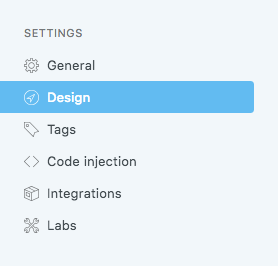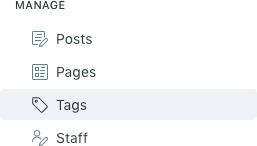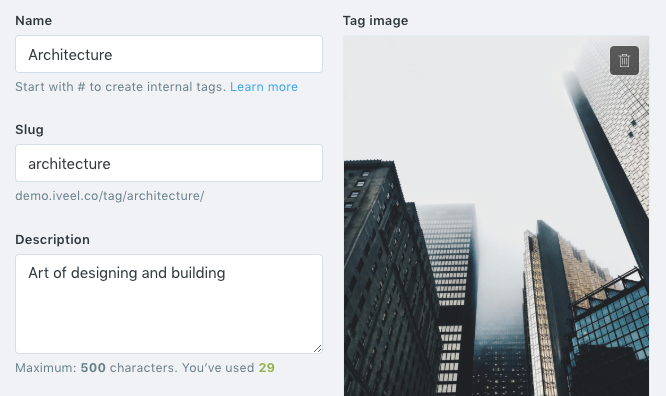Dope - Ghost Theme Documentation
Table of Contents
- Installation
- Tag Settings
- Related Posts
- Disqus Comment
- Copyright Text
- Social Links
- Widgets
- Hosting Fonts Locally
- Hosting jQuery Locally
Installation
When you purchase a theme from IVEEL, you will have an access to the theme directly on your account page. Once you click the download link, an installable theme file will be downloaded to your computer.
- Navigate to
Settings > Designon your Ghost Admin (yourblog.com/ghost).
- Click
Upload a themeand select the downloaded installable theme file.
- Click
Activate Nowto start using the theme.
Tag Settings
- To setup tags, navigate to `Manage > Tags` on your Ghost Admin.

- Select a tag and its settings will be displayed on the right side.

- Choose a tag image (if the theme supports it), enter a tag name and description in the settings.
Related Posts

- To add tags to a post, navigate to
Postson your Ghost Admin.
- Select the post and click the settings icon on the top right corner.
- Add the tags in
Tagsfield.
Disqus Comment
The theme has a built-in support for Disqus as a commenting system. Follow only these steps to setup Disqus. You don't need to follow the installation tutorial of Disqus on their site.
- Create a new site on your Disqus dashboard.
- Get your Disqus shortname. Please note that your Disqus shortname will be different than below.

- Insert the Disqus shortname in
partials/config.hbsfile.disqus_shortname: 'your_shortname',
Note: Remember to restart your Ghost when you made a change in hbs file.
Copyright Text
You can display some text on your blog's footer section. By default, it displays Powered by Ghost. To change the text, open partials/copyright.hbs file.
copyright: '© All rights reserved.',You can also add some HTML markup.
copyright: '© All rights reserved. <a href="URL_HERE">More info</a>',Note: Remember to restart your Ghost when you made a change in hbs file.
Social Links
Add your social links in partials/config.hbs to display social links on your blog. All links must be full URL.
social_links: {
facebook: 'https://www.facebook.com/iveelco',
twitter: 'https://www.twitter.com/iveelco',
instagram: '',
dribbble: '',
behance: '',
github: '',
linkedin: '',
vk: '',
rss: '',
},Note: Remember to restart your Ghost when you made a change in hbs file.
Widgets
The widget files are in partials/widgets directory. To change the order the widgets or add/remove widgets, open partials/widgets/widgets.hbs and make the changes.
Note: Remember to restart your Ghost when you made a change in hbs file.
Facebook Widget
Open partials/widgets/widget-facebook.hbs file to setup the widget. The only attribute required to be changed is data-href which is your Facebook page's full URL.
| Attribute | Description |
|---|---|
| data-href | The URL of your Facebook page |
| data-small-header | Make the header smaller |
| data-hide-cover | Hide cover photo in the header |
| data-show-facepile | Show profile photos when friends like the page |
| data-hide-cta | Hide the custom call to action button (if available) |
| data-tabs | Tabs to render. Possible values are none, timeline, events and messages |
Links Widget
Open partials/widgets/widget-links.hbs file to setup the widget. Add/remove list items to customize the links. For example, replace _URL_ with an URL and About with some text.
<li>
<a className="u-underline" href="_URL_">
About
</a>
</li>To make a link open in a new tab, add target="_blank" rel="noopener noreferrer" attribute to the link.
<li>
<a className="u-underline" href="_URL_" target="_blank" rel="noopener noreferrer">
About
</a>
</li>Hosting Fonts Locally
- Click here to download the font files.
- Create a folder named
fontsinassetsdirectory. - Unzip the downloaded file and copy the files to
assets/fontsfolder. - Open
default.hbsfile and comment out the line (wrap inside{{!-- --}}) which embeds Google Fonts. You can search for "https://fonts.googleapis.com" to be more specific.{{!-- <link rel="stylesheet" href="https://fonts.googleapis.com/css?family=..."> --}} - Add the necessary CSS in
Settings > Code injection > Site Headerfield.@font-face { font-family: 'Raleway'; font-style: normal; font-weight: 400; src: url('../fonts/raleway-v14-latin-regular.woff2') format('woff2'), url('../fonts/raleway-v14-latin-regular.woff') format('woff'); } @font-face { font-family: 'Raleway'; font-style: normal; font-weight: 500; src: url('../fonts/raleway-v14-latin-500.woff2') format('woff2'), url('../fonts/raleway-v14-latin-500.woff') format('woff'); } @font-face { font-family: 'Raleway'; font-style: italic; font-weight: 400; src: url('../fonts/raleway-v14-latin-italic.woff2') format('woff2'), url('../fonts/raleway-v14-latin-italic.woff') format('woff'); } @font-face { font-family: 'Raleway'; font-style: italic; font-weight: 700; src: url('../fonts/raleway-v14-latin-700italic.woff2') format('woff2'), url('../fonts/raleway-v14-latin-700italic.woff') format('woff'); } @font-face { font-family: 'Raleway'; font-style: normal; font-weight: 700; src: url('../fonts/raleway-v14-latin-700.woff2') format('woff2'), url('../fonts/raleway-v14-latin-700.woff') format('woff'); } @font-face { font-family: 'Raleway'; font-style: normal; font-weight: 800; src: url('../fonts/raleway-v14-latin-800.woff2') format('woff2'), url('../fonts/raleway-v14-latin-800.woff') format('woff'); }
Hosting jQuery Locally
- Click here to download the latest version of jQuery.
- Save the file as
jquery.min.jsinassets/jsfolder. - Open
default.hbsfile and search for "https://code.jquery.com" to find the<script>tag which embeds remote jQuery. - Replace the entire
<script>...</script>tag with:<script src="{{asset "js/jquery.min.js"}}"></script>
